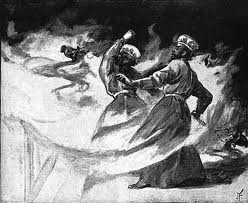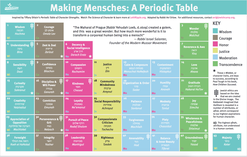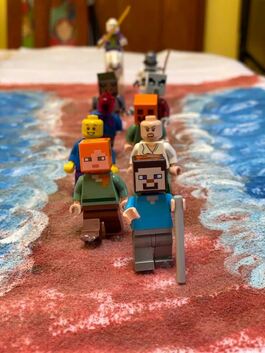 Parashat Shemini No Sacrifice Needed: Modern Day Nadav and Avihu by Martin Rawlings-Fein on Saturday April 18, 2009 24 Nissan, 5769 Leviticus 9:1 - 11:47 In Parashat Shemini the Mishkan (tabernacle) is dedicated, Aaron is installed as high priest, and Aaron’s sons Nadav and Avihu suffer an unfortunate fiery death. The “strange,” “alien,” or “unauthorized” fire Aaron’s sons brought to the altar was an act blasphemous enough to cause G-d to lash out at the young men in anger, killing them instantly. I struggle with the similarities between this condemning, angry G-d and some of the members of my own family. Turning the Torah until it speaks to me as a father, son, and a transsexual bisexual man, I try to find answers in the text. Sometimes though, the answers I find provide no easy solution to the problem, and no matter what I try, that angry patriarchal tyrant still looks more like my uncle than G-d. As a father I am haunted by the knowledge that the G-d I pray to in my 21st century life would end a human life in flames. Perhaps context will provide some clue to G-d’s abhorrent behavior. When the Israelites’ were slaves, for generations they had to follow Egyptian religious practices, including praying to idols and burning incense on altars. Were Nadav and Avihu just following what they had been doing since they were young or were they irreverently drunk (as some commentators suggest)? Both of these back stories fail to justify G-d’s extreme reaction. G-d smote Nadav and Avihu because s/he didn’t like their method of approach? Their fire was somehow not good enough? I still can’t stomach this violent G-d. How do we, as modern day Jews, reconcile the fact that G-d burned the sons of Aaron alive? As a parent who could never think of my child dying in that way, I struggle with G-d, the text, and the feeling that there are no easy answers. In August of 2008 when the “No on 8 Campaign” was in full swing, a family member called to wish me a happy birthday. As we were shooting the breeze he said that he really wanted to have a serious conversation with me. I was bracing myself for the question about the $30 I owed him from his daughter’s school fundraiser. What happened next was unnerving. He said that he wanted me to move out of San Francisco because he was certain that G-d was going to smite the city. I thanked him for his concern and asked him why he thought this was going to happen – that I wasn’t surprised by this new development says a lot about our relationship. I engage him in theological debates all the time, this was no different. Yet, it was, because the answer was very difficult to hear. His reasoning was that G-d was disappointed in those who had abandoned the covenant and that the cities had become wicked places where homosexuals and people with loose morals had congregated. He was concerned that these sinners were reinterpreting G-d’s word and blaspheming against him. As he spoke, I realized that the blasphemers he was talking about were me and my chosen family. To him, we were all Nadav and Avihu bringing strange fire to G-d and therefore retribution was waiting in the wings. He was trying to get me to leave San Francisco but his words were tearing at my soul. I found a way to disengage from the conversation and began trembling after the call. I tried to laugh it off with my mother during her phone call later in the day; apparently he had called other family members and given them the same warning. I am, however, the only family member who would fit the description of the sinner that he thought G-d would take the time to smite. When I first transitioned from female-to-male my family of origin smote me with their words and actions. They stopped inviting me to family events, took my pictures down off the walls, and created an expectation that my soul would not be “saved” if I continued my wicked ways. One family member went so far as to write me a letter stating that she loved me with all her heart but hated the man I had become because G-d had sanctioned her to hate the things he saw as abominable. My reaction was pretty swift; I created pockets of community and family from those whom did truly love and care for me. I didn’t look back to my family of origin except to those who did not abandon me. Now that I am grown and have a daughter of my own, we all see things in a new light. The family of origin that rejected me because of my method of approach to life has finally grown enough in their own spiritual space to see me as the man I am. I tend to see G-d, like my family of origin, as an ever changing force. We as Jews are often commanded to remember and to never forget what has happened. This grounds us in the past but does not negate our progressive yearnings. Through this lens I can look back at the slaying of Nadav and Avihu and see how G-d has transitioned with us through the struggle of who we are as a people. Similarly, my family of origin can now call me on my birthday and plead with me to leave a city that they see as wicked. Because in addition to seeing my sexual preference, my gender identity and my religious choices, they also see me as a father, a son, and a man that they care about. Those they label wicked and abominable are, like me, just struggling to be seen as human beings rather than blasphemers’ bringing strange fire to G-d. When those who only see the literal translation learn the deeper lessons of the text, then we will all truly be closer to G-d with no sacrifice needed.
0 Comments
 Making Mensches: A Periodic Table Making Mensches: A Periodic Table Today is the 17th of Nisan and the 2nd day of the Omer. For those scratching your heads about the "Omer." The Omer is a unit of counting barley sheaves that marks each of the forty-nine days of traveling the desert from Egypt to Sinai, which culminates with the celebration of Shavuot. Shavuot is when the Jews celebrate giving of the Torah, and we are all there, present, past, and future, becoming a nation committed to serving G!d. We have many holidays this time of year, not just Passover. But back to the Omer, why do we count bundles of barley to remember our time in the desert? Well, think of the countdown as a way to show our Antici...passion for the Torah to come. We countdown for rockets headed to the heavens, for ball drops in Times Square, and for all types of events. Even the Swedish rock band Europe can't escape their 1986 hit, "The Final Countdown," which continues playing everywhere there is a countdown. When we start the count, it begins on the second day of Passover, and some people will stop getting haircuts as this time is also a period of semi-mourning. The story goes that a plague killed 1200 pairs of Rabbi Akiva's students (Babylonian Talmud Yebamoth 62b). Still, the epidemic might mean they died in revolt because the Bar Kokhba Rebellion was active around the same time. Some Jewish customs forbid haircuts, shaving, and listening to instrumental music, unlike vocals, so the Maccabeats are a-okay, or conducting weddings, parties, and dinners with dancing. The thirty-third day of the Counting of the Omer, or Lag BaOmer, is when these restrictions end for Ashkenazim, and many Jewish folks will get their hair cut or have their young child's first haircut on Lag BaOmer. Sephardim tend to have their customs around that, as do Mizrachi Jews. Some carry on with their semi-mourning until Shavuot. It all depends on the individual community, its standards, and minhag. We count these barley sheaves because the Jewish calendar is predominantly agricultural. During Passover, there is a shift from praying for rain to praying for dew. Out of this agricultural calendar that moves with the moon, we get another innovation, the Middot—or working on one's good characteristics through reflection and bettering one aspect for each day for the 49 days. From agrarian to spiritual in just 49 steps, over 2000 years as the first known Middot compiled by Rabbi Hillel in the 1st century BCE (or Before the Common Era)1. I find these innovations over time exciting and awesome and try counting each day with intention like generations before. If you want to try to say the blessing tonight, please follow below: When we "count the Omer," we recite a blessing each night to count the next day: The count uses days ("Today is the twenty-fifth day of the Omer,") and weeks and days once there are weeks to count ("which is three weeks and five days of the Omer.”) Start Here:
End with this:
Have fun checking out the resources below like the Velveteen Rabbi, Ritual Well and a periodic table of Middot for exploring Middot with children. Resources: Omer - Velveteen Rabbi - Blogs.com Middot Omer Calendar -- Jewish Ritual - Ritualwell Making Mensches: A Periodic Table (A favorite of mine for exploring Middot with kids.) References: 1. The letters CE or BCE in conjunction with a year mean after or before year 1. https://www.timeanddate.com/calendar/ce-bce-what-do-they-mean.html  Our table runner for Passover with Pharaoh (Joker) on the horse and Moses (Steve) and Miriam (Alex) leading the Israelites to the other side of the Sea of Reeds. Our table runner for Passover with Pharaoh (Joker) on the horse and Moses (Steve) and Miriam (Alex) leading the Israelites to the other side of the Sea of Reeds. Tonight begins Passover, or Pesach, the time of the year when as Jews, some get super serious about kashering the kitchen and eschew all things leavened. Pesach is a major Jewish holiday that celebrates the Israelites' exodus from slavery in Egypt. The holiday occurs on the 15th day of the Hebrew month of Nisan, or the month of April this year. This year, it coincides with Ramadan, this month, and Easter, which is Sunday for those who don't know. This new blog is about being on the path or "On the Derech." You may or may not be familiar with the term "Off the Derech," most often used negatively and is applied to a broad range of ex-Orthodox Jewish individuals. While I wasn't born into an Orthodox family, it was my first entrance into Judaism as a youth. After discovering my father's Jewish heritage, I searched for a path, found Orthodox communities, and fell in love with Torah, Talmud, and study in general. I soon had Orthodox friends and teachers in the community. One minor issue: I was trans, bi, and living a closeted stealth life after high school. Over 20 years ago, when I finally came out as both bi and trans, it altered my relationship with Judaism. I wasn't "Off the Derech," but I was on my self-made path. I explored many of the Jewish movements offered and found my way to my and others' mish-mash of different pathways called "Reformadox." Torah teaches us that we went forth from Egypt, or Mitzrayim, as a "mixed multitude," or erev rav. I like the idea of all the people having their own paths, just like us. It is part of life and how we maneuver kashrut, mitzvot, Halakhah, secularism, Torah, and tradition. "On the Derech" is my home for spreading my thoughts about how we are all searching for our path. Welcome to my blog about it all! And Chag Sameach to everyone! Martin |
Author
Martin Rawlings-Fein (Delegate from AD 19) is a Jewish, Bi+, Trans, Father of Two, SF*EB BiCon Co-Founder, DEI Co-Chair, EdTech Specialist, Sometime Rabbinic Student, & Writer of Queer Liturgy. Archives
February 2023
Categories |

 RSS Feed
RSS Feed